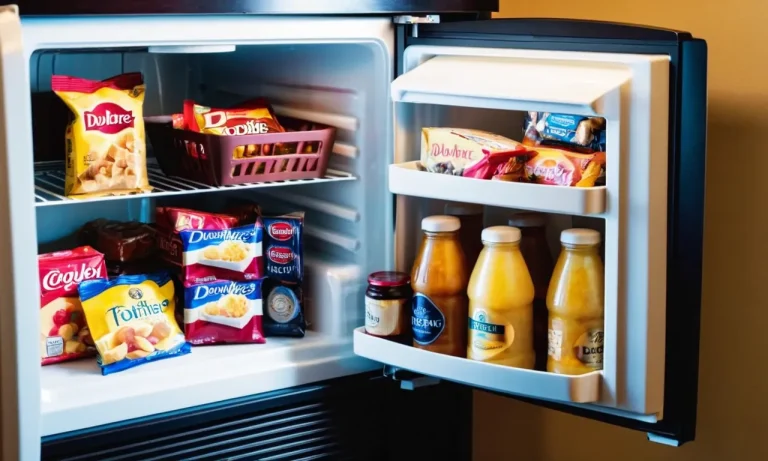Is It Cheaper To Get A Hotel In Thailand When You Get There?
Traveling to Thailand is a dream for many, with its stunning beaches, rich culture, and affordable living costs. However, one question that often arises is whether it’s cheaper to book a hotel in Thailand upon arrival or in advance.
This dilemma can significantly impact your travel budget and overall experience.
If you’re short on time, here’s a quick answer to your question: In most cases, it is cheaper to book a hotel in Thailand when you get there, especially during the low season. However, this approach may not be suitable for everyone, as it involves some risks and trade-offs.
In this comprehensive article, we’ll explore the pros and cons of booking a hotel in Thailand upon arrival, factors to consider, and strategies to help you make an informed decision. We’ll also provide tips on how to find the best deals and negotiate effectively, ensuring you get the most value for your money.
Understanding the Thai Hotel Industry
Thailand’s hospitality sector is a vibrant and dynamic industry that caters to millions of travelers each year. Whether you’re seeking a luxurious beachfront resort or a cozy city-center hotel, understanding the intricacies of the Thai hotel industry can help you make informed decisions and potentially save money on your accommodation.
Peak and Low Seasons
Like many popular tourist destinations, Thailand experiences peak and low seasons that can significantly impact hotel rates. The peak season, which typically runs from November to April, coincides with the cool and dry weather, making it the most popular time for tourists to visit.
During this period, hotels often raise their rates due to high demand. On the other hand, the low season, from May to October, is characterized by hot and humid weather, leading to fewer tourists and lower hotel rates.
According to Tourism Authority of Thailand, hotel occupancy rates can drop by as much as 40% during the low season, resulting in discounted rates to attract travelers.
Hotel Pricing Strategies
Thai hotels employ various pricing strategies to maximize revenue and fill rooms. One common approach is the use of dynamic pricing, where rates fluctuate based on demand. During peak periods or major events, hotels may increase their rates, while offering discounts during slower periods.
Additionally, many hotels offer early bird discounts or package deals that bundle accommodation with activities or services, providing potential savings for travelers who book in advance.
Another strategy is the use of opaque pricing, where hotels offer discounted rates without revealing the hotel’s name until after the booking is made. This approach is popular among online travel agencies (OTAs) and can be a great way to score deals, but it also means you won’t know the exact hotel until after you’ve paid.
It’s important to read the fine print and understand the cancellation policies before booking an opaque rate.
Online vs. Walk-in Rates
When it comes to booking a hotel in Thailand, travelers often face the dilemma of whether to book online or negotiate a walk-in rate upon arrival. While online booking platforms like Booking.com and Agoda offer convenience and transparency, they may not always have the best deals.
On the other hand, walking into a hotel and negotiating a rate can sometimes yield better prices, especially during low seasons or if the hotel has availability.
However, it’s important to note that walk-in rates can be hit or miss, and the process can be time-consuming and stressful, especially if you’re trying to find accommodation during peak periods. Additionally, some hotels may not offer walk-in rates or may have limited availability for such deals.
It’s always a good idea to have a backup plan or a few options in mind when trying to negotiate walk-in rates.
| Online Booking | Walk-in Rates |
|---|---|
|
|
Advantages of Booking Upon Arrival
Flexibility and Spontaneity
One of the biggest perks of waiting to book your hotel in Thailand until you arrive is the flexibility and spontaneity it allows. 😎 You’re not locked into any set plans or dates, giving you the freedom to go with the flow and change your itinerary on a whim.
This can be especially valuable for those with a more adventurous spirit who prefer to let their travels unfold organically. Plus, you never know when you might stumble upon a hidden gem or meet fellow travelers with exciting recommendations for places to go.
Negotiating Power
By booking in person, you gain a significant advantage in negotiating room rates. 💰 Hotels in Thailand, especially smaller or independently-owned ones, are often more willing to offer discounts or better deals to walk-in guests, as they’re eager to fill vacant rooms.
This can be particularly true during low seasons or periods of lower occupancy. According to Travelfish.org, a reputable travel website for Southeast Asia, discounts of up to 50% off the listed rates are not uncommon when booking on the spot.
Avoiding Prepayment and Cancellation Fees
When you book online or through a third-party site, you’re often required to pay in advance or risk hefty cancellation fees. However, by waiting until you arrive in Thailand, you can avoid these unnecessary charges and enjoy more flexibility with your finances.
💸 This can be especially beneficial for budget travelers or those who prefer to keep their options open. Plus, you can physically inspect the room and hotel amenities before committing, ensuring you get exactly what you’re paying for.
While booking upon arrival in Thailand offers numerous advantages, it’s important to keep in mind that availability may be limited during peak seasons or in popular tourist destinations. To avoid disappointment, it’s always a good idea to have a backup plan or be prepared to be flexible with your accommodation choices.
Additionally, for those seeking luxury or specific amenities, booking in advance may still be the more prudent option. 🤔 Ultimately, the decision to book before or after arrival in Thailand will depend on your travel style, budget, and preferences.
Potential Drawbacks and Risks
Limited Availability During Peak Season
One of the biggest drawbacks of not booking a hotel in advance is the limited availability during peak travel seasons in Thailand. Tourist hotspots like Bangkok, Phuket, and Chiang Mai experience a surge of visitors during holidays, festivals, and peak months, making it challenging to find vacant rooms at desirable hotels.
According to data from the Tourism Authority of Thailand, hotel occupancy rates in popular destinations can reach up to 90% during peak seasons. This means you might end up settling for less-than-ideal accommodations or paying exorbitant last-minute rates. 😕
Compromising on Location and Amenities
By not securing a hotel reservation beforehand, you may have to compromise on location and amenities. The remaining options could be situated far from the main attractions, lack essential facilities, or fall short of your desired standards. This can significantly impact your overall travel experience, as you might spend more time commuting or sacrificing comfort.
According to a survey by TripAdvisor, 78% of travelers consider location as the most crucial factor when choosing a hotel. Don’t let spontaneity ruin your dream vacation! 🤔
Dealing with Language Barriers
If you’re not fluent in Thai, navigating the hotel booking process on the spot can be a daunting task. Language barriers can lead to miscommunications, misunderstandings, and potential frustrations. While many hotels in popular tourist areas may have English-speaking staff, smaller or more remote establishments might not have the same level of language support.
This can make it challenging to communicate your preferences, negotiate rates, or understand the terms and conditions. According to a study by Booking.com, language barriers are one of the top concerns for international travelers. 😬
While spontaneity can be exciting, it’s essential to weigh the potential drawbacks and risks of not booking a hotel in advance in Thailand. By securing your accommodation beforehand, you can enjoy peace of mind, avoid potential disappointments, and ensure a hassle-free and enjoyable trip.
Don’t let the spur-of-the-moment decision ruin your long-awaited vacation! 😊
Tips for Finding the Best Deals Upon Arrival
Researching and Comparing Rates
While it’s possible to get cheaper hotel rates by booking upon arrival in Thailand, it requires some legwork and research. Before you embark on your journey, spend some time browsing popular hotel booking sites like Agoda, Booking.com, and Hotels.com to get a sense of the average rates for your desired location and travel dates.
This will give you a baseline to compare against the walk-in rates you’ll encounter on the ground. 😎 Additionally, check review sites like TripAdvisor to get an idea of the quality and amenities offered by various hotels in your price range.
Negotiating Tactics
Once you’ve arrived in Thailand, don’t be afraid to negotiate! Many hotels are willing to offer discounts to walk-in guests, especially during low seasons or if they have high vacancy rates. 💰 One effective tactic is to show the hotel staff the rates you found online and politely ask if they can match or beat them.
Don’t be afraid to walk away if the deal isn’t satisfactory – there are plenty of accommodations to choose from, and hotels are often willing to negotiate further to secure your business.
Another tip is to inquire about discounts or special rates for longer stays. Many hotels offer substantial discounts for guests who book a week or more, so if you’re planning an extended vacation, this could be a great way to save.
🗓️ Additionally, consider booking directly with the hotel rather than through a third-party site, as some hotels offer better rates or perks for direct bookings.
Considering Alternative Accommodations
While hotels are a popular choice, don’t overlook alternative accommodations like hostels, guesthouses, or vacation rentals. These options can often provide more affordable rates, especially for solo travelers or groups.
🏡 For example, according to HostelWorld, the average hostel dorm bed in Bangkok costs around $5-$10 per night, while a private room can be found for as little as $15.
- Hostels: Popular in Thailand for budget travelers, offering dorm-style accommodations and a social atmosphere.
- Guesthouses: Smaller, family-run establishments that often provide a more authentic local experience.
- Vacation rentals: Platforms like Airbnb and VRBO offer a wide range of apartments, villas, and unique stays for larger groups or those seeking more space and amenities.
Remember, while the prospect of scoring a great last-minute deal is enticing, don’t sacrifice your safety or comfort for a bargain. Do your due diligence, read reviews, and trust your instincts when evaluating accommodations. With a little research and negotiation savvy, you can find an amazing place to stay in Thailand without breaking the bank.
🎉
Conclusion
Deciding whether to book a hotel in Thailand upon arrival or in advance is a personal choice that depends on your travel preferences, budget, and flexibility. While booking upon arrival can often be cheaper, especially during the low season, it also comes with risks and potential drawbacks.
By understanding the Thai hotel industry, weighing the pros and cons, and employing effective strategies for finding the best deals, you can make an informed decision that aligns with your travel goals and budget.
Remember, flexibility and an open mind can go a long way in ensuring a memorable and cost-effective stay in the Land of Smiles.








